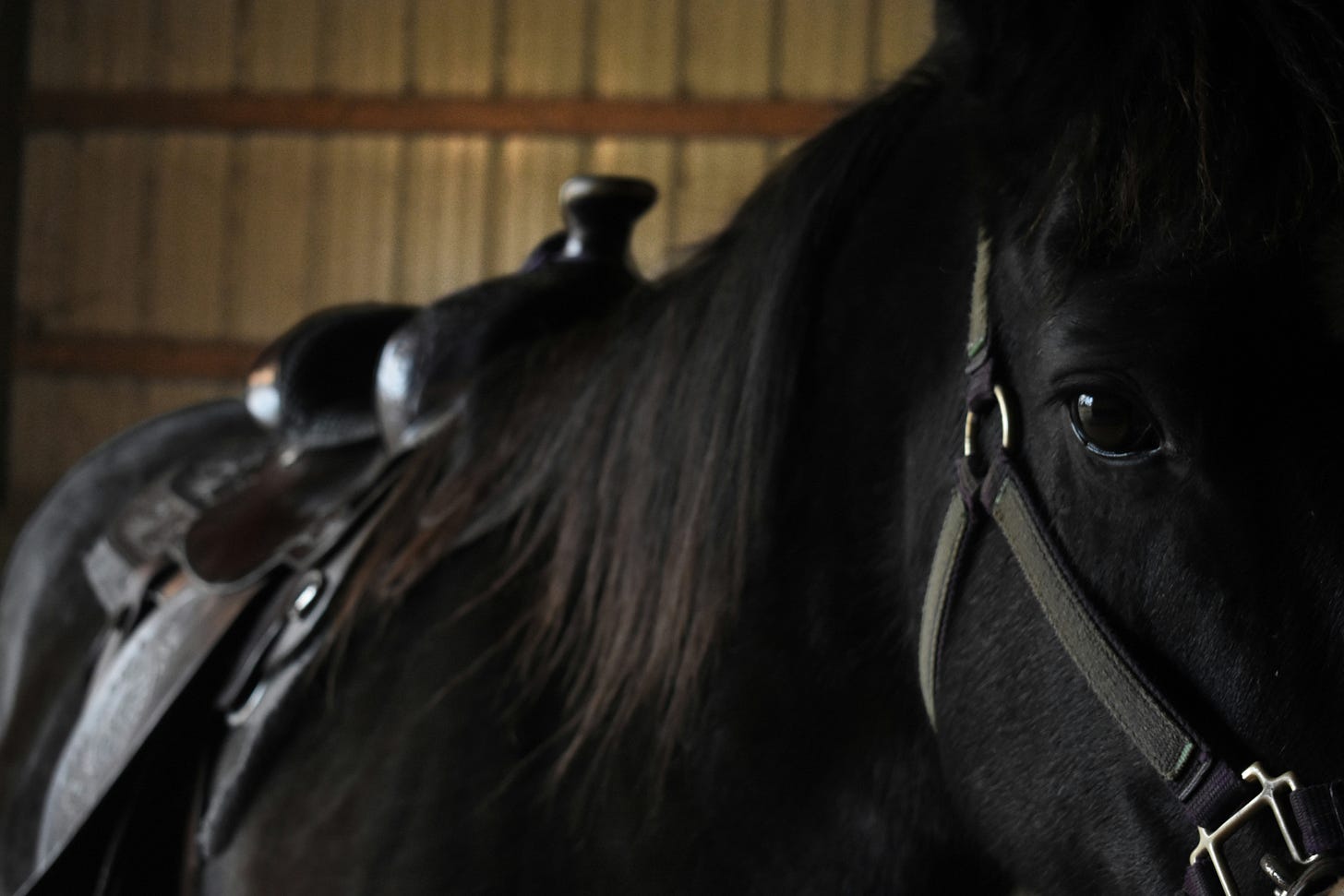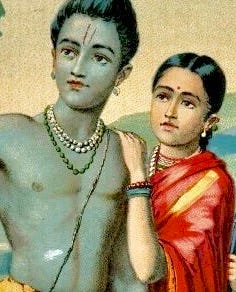
Please be sure to read Part 1 and Part 2 first.
The Queen returned to her ashram just as the Guru came seeking her, having heard the rumor. He reassured her not to heed these rumors, suggesting she stay calm until he could verify the truth.
Meanwhile, the King’s inner circle and the royal priests had scheduled a meeting with the King to discuss the preparations for the sacrifice.
When he arrived and was seated, the royal priest gingerly raised the issue of who would perform the sacrificial rituals, which would take many days to complete.
The royal priest outlined the rigorous schedule and rituals that must be adhered to, the need for undivided attention, and a support structure in place for any emergencies, ensuring the King would remain undisturbed at his place before the fire.
The King’s three brothers took on the responsibility for support, assisted by a host of inner circle advisors.
The King nodded, accepting the duty to conduct the rituals as dictated by ancient scriptures, interpreted by the royal priests and sages specially summoned for their expertise, and to aid in the non-stop chanting of the mantras.
Then, the chief royal priest broached a delicate issue with the King. He glanced towards the King’s mother for a moment of encouragement, then tentatively suggested, “You must take a bride.”
The King, unaware of the circulating rumors, looked at the priest in disbelief. "What do you mean?"
The priest clarified, “The ritual cannot be completed by you alone. You must be accompanied by your wife, your partner in upholding dharma. It is time, for you to cast away this gloom and the sorrows of the past, and for the sake of the family, marry again.”
A deep physical pain, unlike any the King had felt before, even amidst heartbreak, shot through his heart and chest, incapacitating him momentarily.
The royal priest, oblivious to the discomfort of the King, reiterated,
“The ancients prescribe that only a married couple may perform this sacrifice for its effects to be felt throughout the whole kingdom and by the Royal family. It is unfortunate what has transpired earlier. As the preserver of Dharma and a King whose righteous conduct the world emulates, you must overcome your reluctance and marry a suitable Royal Princess. The Kingdom also needs an heir, and it is your duty as King to ensure succession. Therefore, after thorough discussion and debate, we have arrived at the conclusion that you must marry.”
Saying so, he got up and showed the King a rolled-up scroll in his hand, containing a list of names that had been shortlisted for such an honor, for the King to decide in the end, which name suited him most.
Before the priest could unfurl the scroll, the King stood up and said in a quiet but slightly unsteady voice, due to the anger building within him, “Who conceived this notion?”
Prince Lakshmana, the King’s brother who knew him best, having spent fourteen years in exile by his side, spotted the warning signs first. Earlier, in the private meeting convened to prepare a united front before the King, he had protested this recommendation but was overruled, dismissed as too young to meddle in matters of religion and state.
Now, the ground shook with the quiet anger of the King as he stood and demanded to know who among that circle dared to suggest he seek a new bride.
"I have a wife,” he said, his voice quietly firm, sending a chill down the spines of the less brave advisors. They had never seen him speak so, as he continued,
“The righteous Sita, who walked beside me in the forest for fourteen years, who lived in poverty despite being a princess, who bore all manner of hardship without a single complaint, and shared a poor fate in marrying me.”
The royal priest glanced again at the mothers for support and addressed the King confidently, without fear, bolstered by the King’s just and fair governance,
“Dear Rama, we mean no disrespect to the memory of Queen Sita, and her virtuous nature, but it is impossible to return to the past. We must consider what must be done now as the kingdom cannot be left in this state. You have an obligation to your ancestors, your family, and the people of this kingdom, to marry and continue the lineage. Without a bride, you cannot perform this critical sacrificial worship, and this must be the priority for you as King.”
So speak those who have never experienced profound love, and are guided by worldly practical considerations rather than the imperatives of the heart.
Then the King turned to his birth mother, and the two step-mothers, “Dear Mothers, did you also acquiesce in this foolish errand? Have you forgotten Sita? Do you not recall how she devoted herself to serving you, never once seeking her own comfort until you were fully attended to?
Did you forget how Sita, upon hearing I was to go into exile at father’s behest, instantly decided to join me, as a new bride, and without hesitation, forsaking all the riches and comforts of the Royal Palace, even though she had no need to do so?”
As he recounted Sita's goodness, tears swelled in the family's eyes. They had been misled by the King's demeanor in recent years; he had not forgotten Sita.
Every word from him reminded them that he recounted the incident as if it had just occurred, not merely as a memory but as a scene he relived in reality, in his mind, regardless of what he presented to the world.
The mothers protested, and Kaushalya, his birth mother, stepped forward to comfort him. She motioned for him to return to his seat, standing by his side as she spoke,
“No, dear Rama, we have not and could never forget Sita. But dearest, we cannot bear to see you so unhappy, and so bereft of the personal joy that is by rights yours to enjoy. Which King has sacrificed to this extent, that you must do so? You too deserve to be happy and to enjoy the privileges of your Royal position.
Do you think we do not know that you sleep on the floor each night as if you are in the forest with Sita? Do you think we haven’t noticed that you choose to eat simple meals, rather than the rich dishes of the Palace? Do you think we do not watch you toil night and day for the betterment of the people, without any thought to your own happiness?
Rama, watching you these past years, we cannot but wonder if you haven’t also gone, in spirit, to the forest with Sita?
A sob rose from the group, whether from the mothers or the daughters-in-law, some of whom were Sita's sisters, was not immediately clear. The mother continued to advise him,
“What is done, is done, dear Rama. No one can bring back Sita, and no one knows where she is today. It has been ten years. Have you not mourned enough? We cannot see you suffer so, without any children or familial life.
For our sakes, at least, consider choosing a bride from among the most eligible presented by the advisors from lands afar, and marry. Start a family. Forget the past, dear son, as we cannot watch your misery anymore.”
The King surveyed the circle of advisors slowly, each face revealing their hope for his future.
Finally, his glance rested on his younger brother, who knew Sita longer and far better, than the others. “Lakshmana, have you too forgotten Sita? How she cared for you in the forest, and never let you feel you were far from home, as she made a new home for us in the forest. Dear brother, did Sita serve you any less, that you have now joined those who have brought me this proposal?”
Lakshmana cried out, “No, no,” and fell at Rama’s feet, “Forgive me, I tried to persuade them, but they would not hear of it,” he said as he stood up again. “Not a day goes by that I don't remember Mother Sita too -her kindness, her gentle nature, her ready smile, and her willingness to forgive her son’s mistakes. I cannot forget my unhappy role in following your command.”
Despite his own misgivings, Lakshmana still ventured to suggest, “But, dear brother, my love for you is too great to see you suffer. The elders suggest a remedy, and I am duty bound to present it to you, in the hope that you may find some solace in it.”
At this, Rama was taken aback. He realized that his circle of advisors, with all their worldly rationale and good intentions, wanted to restore his happiness. Yet, they understood so little about him and knew even less about where his true happiness lay.
Was it even possible to explain to the world, or his family, no matter how close or how much they loved him, what Sita meant to him?
Sighing, he turned away from them to regain his composure and calm.
The circle awaited a decision, hopeful they had convinced him of the right course of action.
Rama then turned to his birth mother, and addressed her first,
“Mother, I am devoted to serving you, the people, and the kingdom’s many needs. Yet, the happiness you speak of - that went with Sita, the day I had to exile her, and there is no happiness to be found in this world without her. This is as true as the sun and moon rising in the sky each day.
You speak of my discomforts in my daily life in this palace. But have you truly considered Sita’s plight? None of this was her fault; and her only fault, if you call her loving me, a fault, lay in marrying me, for which cause, she has had to suffer her whole life.
While I do my duties by choice, Sita is compelled by circumstance. I cannot forgive myself or forget that my duties to my forefathers and the people of this kingdom, necessitated my actions.
Yet, know this to be equally true: I may have banished Sita from my life, but I have never banished her from my heart and soul.
My gentle Sita, raised among the comforts of the palace, wanting for nothing, chose to marry me and share in my destiny. She bestowed gladly, her companionship, enduring the trials of this life for my sake.
Now, am I to forget her merely to perform this sacrifice (‘Yagna’)? Am I to pretend she is no longer my wife and dishonor all her struggles?”
The crowd in the private family hall remained silent, somewhat embarrassed yet still holding onto the hope that the King would acknowledge the necessity of living in the real world, where feelings alone are not enough.
Rama rose once more, recognizing that despite his earnest attempts to persuade them, they remained steadfast in their beliefs.
So, he spoke, in firm and calm voice, that effortlessly filled the small chamber's silence,
“O wise ones, and dear mothers, and all family gathered here to provide counsel. I commend your well-intentioned efforts. I am honored by your concern for my welfare.
I am sharing this with you today so this matter may never arise again - I swore an oath to my wife the day I met her and the day I married her.
So, know this, all who are present here, and let the Gods in the Heavens, also witness my words, that in this life, I am Sita’s and Sita’s alone.
She is my wife, whether here with me physically, or in spirit alone, and no other woman shall ever take her place in my heart or life.
No force in the three realms and beyond can move me from this conviction. Therefore, I request you to abandon your efforts.
For what is a man, if he cannot honor his word in this world?
I would sooner give up my life than betray my word of honor.”
At each word he spoke, its weight hung in the air, shaking the Earth with the unwavering resolve it carried. Never before had a man made such an oath, and never again would it be uttered with such ease. His declaration echoed through the ages since it was first aired in an ancient land.
Seeing the determination written on the King’s face, the priests begged pardon and sought time to confer among themselves as to what could be done to satisfy the rigors of the sacrifice. For that was still on the table and needed resolution.
The King left the chamber and returned when word was sent that the priests had conceived of an alternate solution.
The priests informed the King that they had delved further into ancient texts and the memories of the wisest among them, and determined that it was possible, at times, to install a statue representing a living person who could not be physically present. They could consecrate it with the life spirit of that individual, through the use of sacred mantras, ensuring that, for all intents and purposes, the person was present in form. This would fulfill the need to ensure that the King and his dharmic partner performed the rituals and appeased the Gods to whom the worship was offered.
Upon hearing this resolution, the family rejoiced and the King was satisfied.
Immediately, the order was given to commission the most exquisite representation of Queen Sita in golden form, to commence without delay and to be prepared for the first day of the Ashwamedha sacrifice.
The word also spread among the people: the King had not forgotten Sita, and had proclaimed an oath acknowledging her as his sole wife in this lifetime. Some marveled at the honor bestowed upon Sita, others at the love shared between the couple, and still others at the King's unwavering commitment to his word.
Whatever camp they belonged to, all discussions ceased regarding the prospect of another Queen. In hindsight, some whispered about the injustice done to Sita and to the King. However, their attention soon shifted to the sacrificial preparations, which began in full swing.
The Ashwamedha sacrifice was undertaken rarely, reserved only for the most powerful of kings due to its rigorous ritual and form.
It involved releasing a Royal horse into the lands for a year, accompanied by the King’s army. The horse, carefully selected for the occasion from the finest of the Royal steeds, was adorned with ritualistic colors and marked with the Royal arms to signify it as the King’s horse. A proclamation hung over its saddle to announce its purpose.
The proclamation served notice to all kingdoms across the lands wherever the horse roamed, declaring it should be free to do so as the emissary of the King.

If anyone in this or any other kingdom chose to stop the horse, it would be tantamount to declaring war against the King. They would be required to engage in battle against the King and his armies to seize victory and retain possession of the horse. Failure to do so would result in their lands becoming part of the King’s realm, allowing the horse to continue its journey unimpeded.
Thus, a royal horse was selected for the King and, after receiving due ritualistic honors, it was released into the lands to roam freely. It was accompanied by one of the King’s brothers, who led the King’s army.
Meanwhile, the golden sculpture was completed, and when Rama first laid eyes on it, he was struck by the beauty of Sita captured by the finest sculptor of the land. It was fortunate that it was a private viewing, for the King's eyes welled up, and he was overwhelmed by memories of Sita.
He gave his blessing for the statue to be used in the ritual in place of the real Sita.
Thus, it came to pass that the priests initiated the most powerful Yagna, with the King seated alongside the consecrated sculpted form of his wife, Sita, invoked in spirit through the sacred mantras chanted by the wise sages.
As long as the horse roamed, the King sat to perform the daily ritual, accompanied by his wife in form and spirit, as prescribed by the priests.
Thus, the kingdom awaited the peaceful conclusion of the Yagna, for who, they confided among themselves, would be brave enough to challenge the might of Rama? After all, he had vanquished the evil demon, Ravana, in just ten days, and that too, with only an army of monkeys.
However, this time, it was his main army, led by his brave brother. Therefore, they reasoned, who would be foolish enough to challenge the might of Rama?
Did you find this retelling of King’s keeping his vow interesting? Wondering if anyone would dare challenge the King's horse. Find out below in Part 4 below!






Jayshree, Another great chapter. D
Thank you Jayshree 💙